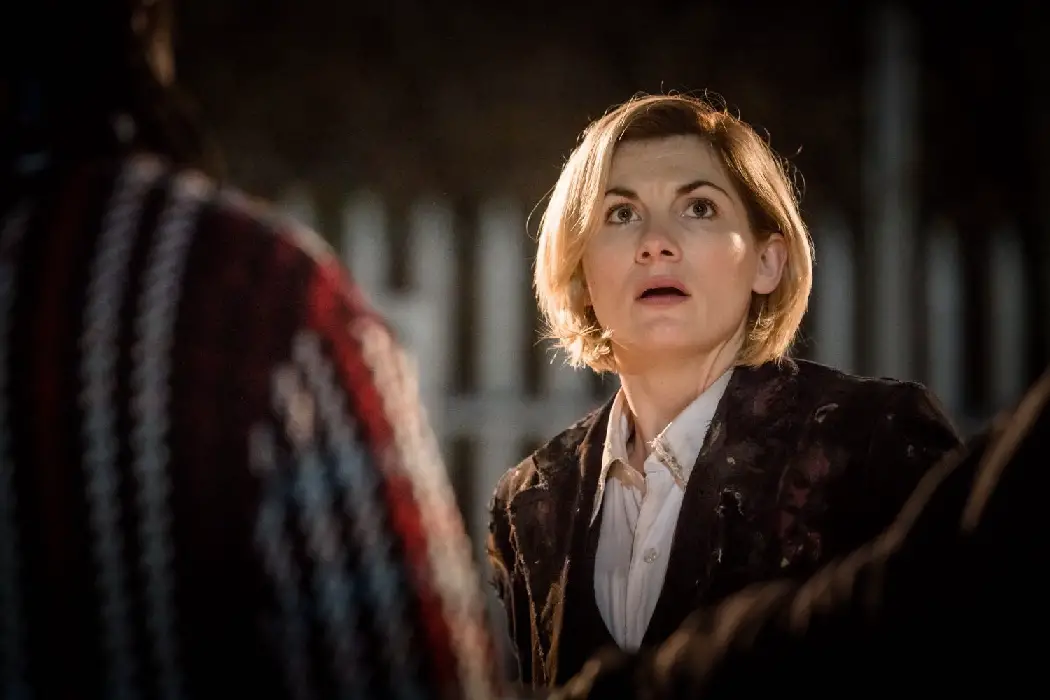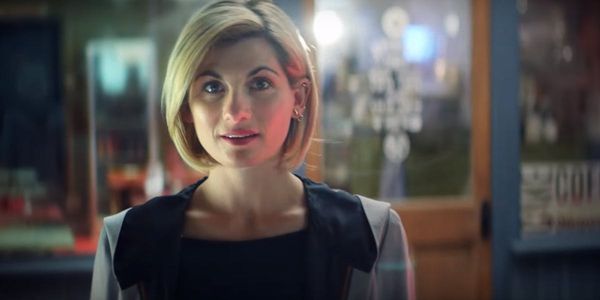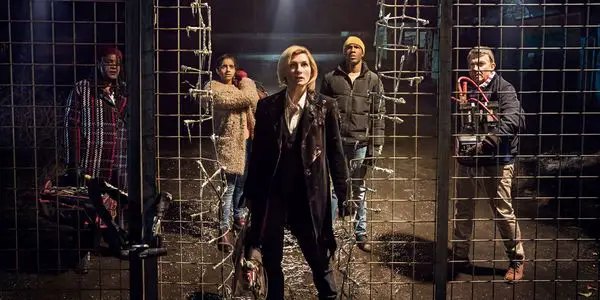DOCTOR WHO (S11E1) “The Woman Who Fell To Earth” And Stole The Show

Scottish cinephile & feminist, with a Masters in Film &…
Doctor Who returned this week and the 13th Doctor will see us now…
On Sunday evening the long-awaited first female Doctor arrived on our screens in the shape of Jodie Whittaker, and her debut episode, aptly titled “The Woman Who Fell to Earth”, also introduced Doctor Who fans to her new team of companions – Ryan (Tosin Cole), Yaz (Mandip Gill), and Graham (Bradley Walsh).
After she falls through the roof of a train carriage, which also happens to be under attack from a mysterious ball of snake-like monsters, Whittaker becomes a force of nature, continuing the Doctor’s quest to protect the Earth from outside attackers and invasions.
The Doctor is a Woman
Since Doctor Who‘s first episode back in 1963, the Doctor had previously regenerated and changed faces eleven times, from middle-to-old-age white man to middle-to-old-age white man. Back in July 2017, when the BBC announced that the 13th Doctor would break free from this cycle, and would next be played by a woman, this change was welcomed by many of the show’s dedicated fans, and in equal measure, the news also received criticism for breaking the mould of the Doctor’s perceived gender identity as a male character.

After she comes crashing down to Earth, and while still in the regeneration healing process, the Doctor is exhausted and sleeps on a couch in Graham’s home. While she naps and continues to reformat her cells, this shows a vulnerability not previously seen in the character of the Doctor, and this acts as a reminder that she is more than just an action hero, that she is a being with weaknesses and doubts. However when she’s ready to save the day in the climactic moments of the episode, she becomes the decisive woman that her companions need, saying “If you want something done right..”, seconds before jumping from crane jib to crane jib.
As a shape-shifting alien with an exterior similar to humans, the Doctor is capable of surpassing gender expectations and takes on an otherworldly gender fluidity, showcasing equality while also revealing different aspects of the Doctor’s character, and hopefully promoting a progressive outlook throughout the rest of the coming episodes.
Glass Ceiling Be Gone
In the build-up to the Series 11 premiere, the BBC released several teaser trailers to get their fans on board with Jodie Whittaker‘s 13th Doctor after an initial backlash against her casting last year. In one clip released by the BBC, (which you can view here) the 13th Doctor stands in the middle of a large, empty hall, while the colourful glass ceiling above her crashes down.
Smashing the glass ceiling through her presence in this space alone, and through her own interpretation of the Doctor’s character, Whittaker simply says “whoops” which is then followed by “It’s About Time” appearing in bold, gold lettering. With the female perspective at the forefront of one of the longest-running sci-fi shows of all time is a huge moment for Doctor Who, and also in the wider context of British science fiction history. After years of speculation surrounding the casting of a female Doctor, we finally have her and it is an exciting addition to the Doctor’s long-lasting character arc.

“We don’t get aliens in Sheffield!”
The most obvious updates to the show are Whittaker and her group of companions, but the characters’ accents also provide an alternative to the usual London-centric voices which are quite often the go-to styles for many productions. This change in the action’s location ties in with Whittaker’s own background, hailing from Skelmanthorpe in the Midlands, so she keeps her real accent while being the Doctor, much like her predecessor, Glaswegian native Peter Capaldi.
While London is the main backdrop for many British dramas, by pushing the action north in this episode and putting aliens in Sheffield, this brings the story to a more relatable ground for rural audiences, and basically anyone living outside of the ‘Big Smoke’. When the average Joe character from the train becomes an alien’s prey, this hits home for the viewer – that anyone could be a target, and that it’s not exclusive to London-based fictional characters – which successfully creates both a sliver of fear and a glimpse of compassion in the show’s audiences. The episode puts more of Britain on the world stage through this internationally popular programme, showing there’s more to the country, and more for aliens to attack, than London alone.
Conclusion
It’s all change for Doctor Who in Series 11, after the departure of writer and producer Steven Moffat last year, with the new writer Chris Chibnall breathing new life into a stale, male-dominated cycle of Doctors, and providing progressive updates to hopefully shake things up.
Did you see Jodie Whittaker’s first episode? Let us know your thoughts below!
The next episode of Doctor Whowill air on BBC One (and BBC America) at 6.55pm GMT on 14 October 2018.
Does content like this matter to you?
Become a Member and support film journalism. Unlock access to all of Film Inquiry`s great articles. Join a community of like-minded readers who are passionate about cinema - get access to our private members Network, give back to independent filmmakers, and more.
Scottish cinephile & feminist, with a Masters in Film & Television Studies; currently based in Canada. Read more at http://debbiewritesreviewshere.com













